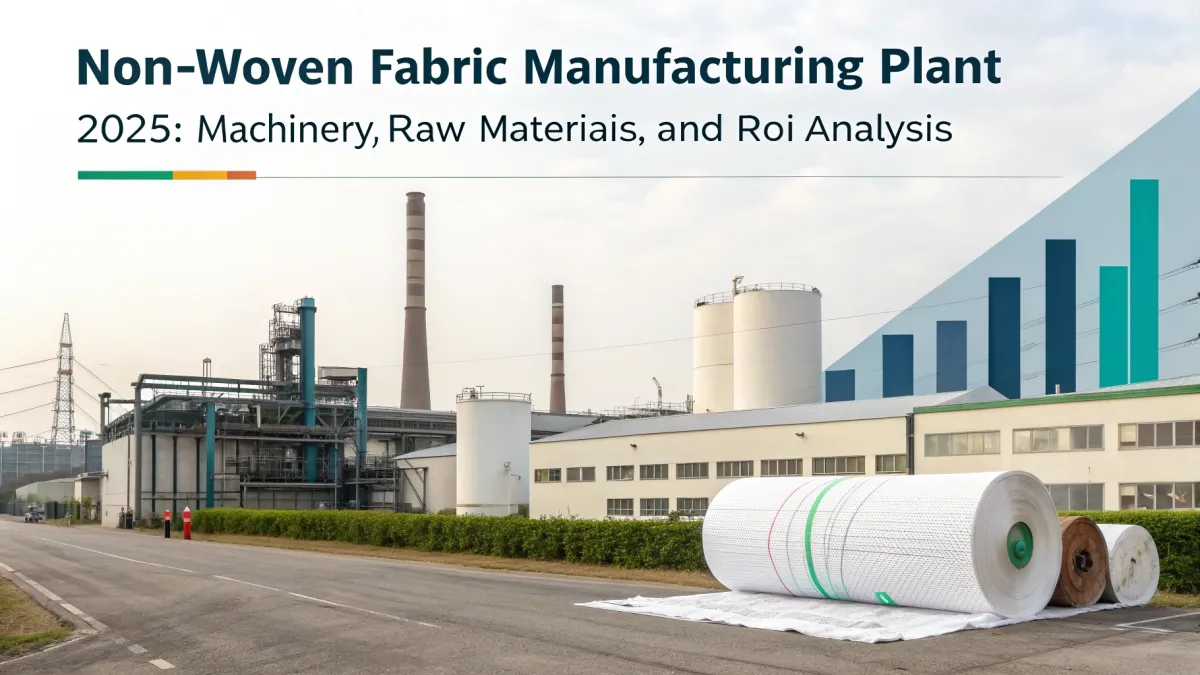
Non-Woven Fabric Manufacturing Plant 2025: Machinery, Raw Materials, And ROI Analysis
Establishing a non-woven fabric manufacturing plant requires careful planning of raw material sourcing, machinery selection, and production processes. Key considerations include market demand assessment, plant location, compliance with quality standards, and efficient supply chain setup to ensure profitability.
IMARC Group's report, titled “ Non-Woven Fabric Manufacturing Plant Project Report 2025: Industry Trends, Plant Setup, Machinery, Raw Materials, Investment Opportunities, Cost and Revenue,” provides a complete roadmap for setting up a non-woven fabric manufacturing plant. It covers a comprehensive market overview to micro-level information such as unit operations involved, raw material requirements, utility requirements, infrastructure requirements, machinery and technology requirements, manpower requirements, packaging requirements, transportation requirements, etc.
Request for a Sample Report : https://www.imarcgroup.com/non-woven-fabric-manufacturing-plant-project-report/requestsample
Non-Woven Fabric Industry outlook 2025:
The non-woven fabric industry outlook for 2025 indicates strong growth driven by rising demand in healthcare, hygiene, automotive, and packaging sectors. Increasing awareness of sustainable and disposable products, coupled with advancements in production technologies, is expected to boost market expansion. Emerging economies are likely to witness significant adoption due to infrastructure growth and rising healthcare investments. Additionally, innovations in eco-friendly and biodegradable non-woven materials are anticipated to shape future trends, aligning with global sustainability goals. Overall, the industry is projected to maintain a positive trajectory with diverse opportunities across multiple end-use applications.
Key Insights for Non-Woven Fabric Manufacturing Plant Setup:
Detailed Process Flow:
-
Product Overview
Unit Operations Involved
Mass Balance and Raw Material Requirements
Quality Assurance Criteria
Technical Tests
Project Details, Requirements and Costs Involved:
-
Land, Location and Site Development
Plant Layout
Machinery Requirements and Costs
Raw Material Requirements and Costs
Packaging Requirements and Costs
Transportation Requirements and Costs
Utility Requirements and Costs
Human Resource Requirements and Costs
Capital Expenditure (CapEx) and Operational Expenditure (OpEx) Analysis:
Project Economics:
-
Capital Investments
Operating Costs
Expenditure Projections
Revenue Projections
Taxation and Depreciation
Profit Projections
Financial Analysis
Profitability Analysis:
-
Total Income
Total Expenditure
Gross Profit
Gross Margin
Net Profit
Net Margin
Key Cost Components of Setting Up a Non-Woven Fabric Plant
-
Land & Infrastructure – Costs for site acquisition, construction, and facility setup
Machinery & Equipment – Investment in spunbond, meltblown, carding, and bonding lines
Raw Materials – Procurement of polypropylene, polyester, and other fibers
Utilities & Energy – Power, water, heating, and waste management systems
Labor Costs – Skilled and unskilled workforce expenses
Regulatory Compliance – Licensing, certifications, and environmental clearances
Packaging & Logistics – Storage, transportation, and distribution setup
Economic Trends Influencing Non-Woven Fabric Plant Setup Costs 2025
-
Raw Material Price Volatility – Fluctuations in petrochemical-based inputs
Sustainability Demand – Growing need for biodegradable and eco-friendly materials
Global Supply Chain Dynamics – Shipping costs, delays, and geopolitical influences
Technological Advancements – Automation and efficiency reducing long-term costs
Inflationary Pressures – Rising energy, transport, and labor expenses
Government Incentives – Subsidies and support for local manufacturing initiatives
Speak to an Analyst for Customized Report: https://www.imarcgroup.com/request?type=report&id=21734&flag=E
Challenges and Considerations for Investors in Non-Woven Fabric Plant Projects
-
High Capital Investment – Significant upfront costs and long ROI periods
Supply Chain Dependence – Reliance on stable raw material availability
Regulatory Compliance – Strict environmental and safety standards
Competitive Market – Pressure from established global manufacturers
Innovation Requirements – Continuous R&D to meet changing consumer needs
Sustainability Goals – Balancing mass production with eco-friendly practices
Conclusion:
The non-woven fabric industry in 2025 offers strong growth potential, supported by increasing applications in healthcare, hygiene, packaging, and industrial sectors. While the market outlook is positive, setting up a manufacturing plant requires careful evaluation of cost components, economic trends, and regulatory obligations. Investors must address challenges such as high capital requirements, raw material volatility, and sustainability expectations. Strategic planning, adoption of advanced technologies, and alignment with eco-friendly practices will be essential for achieving long-term profitability and competitiveness in this evolving market.
About Us:
IMARC Group is a global management consulting firm that helps the world's most ambitious changemakers to create a lasting impact. The company excel in understanding its client's business priorities and delivering tailored solutions that drive meaningful outcomes. We provide a comprehensive suite of market entry and expansion services. Our offerings include thorough market assessment, feasibility studies, company incorporation assistance, factory setup support, regulatory approvals and licensing navigation, branding, marketing and sales strategies, competitive landscape, and benchmarking analyses, pricing and cost research, and procurement research.
Contact Us:
IMARC Group
134 N 4th St. Brooklyn, NY 11249, USA
Email: sales[@]imarcgroup.com
Tel No:(D) +91 120 433 0800
United States: (+1-201971-6302)
Legal Disclaimer:
MENAFN provides the
information “as is” without warranty of any kind. We do not accept
any responsibility or liability for the accuracy, content, images,
videos, licenses, completeness, legality, or reliability of the information
contained in this article. If you have any complaints or copyright
issues related to this article, kindly contact the provider above.


















Comments
No comment